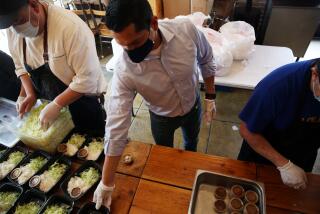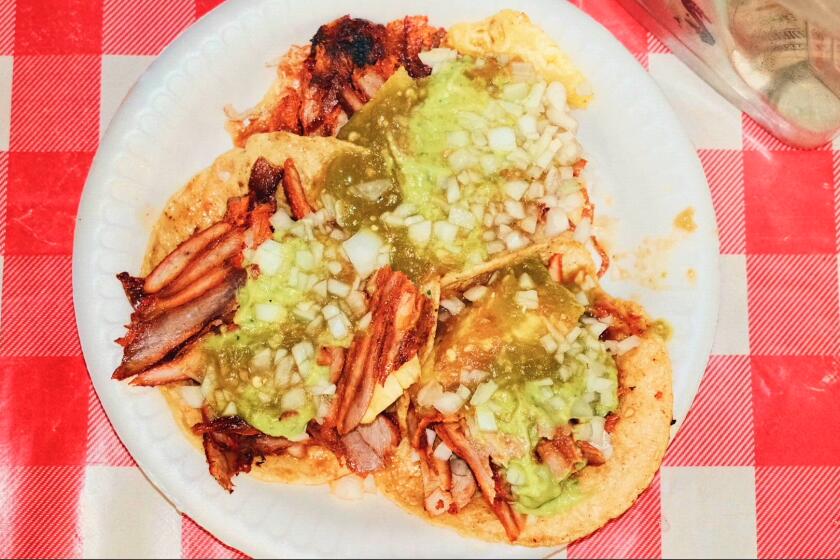The impoverished are not without standards in the plushier suburbs. : Cheese Day at the Club
When I heard that little Agoura Hills was going to distribute cheese to the poor, I smiled. That’s very nice, I thought. A suburban community with a social conscience.
But then, when I heard that Agoura Hills was going to distribute cheese to the poor at its country club, I said right out loud, Wow, that’s classy!
Obviously, I was impressed. I hardly ever say wow and I absolutely never say classy.
I couldn’t resist checking it out when it occurred to me that this might be the first time the poor have ever been given a choice between a nice Brie or a tangy cachat d’entrechaux .
Agoura Hills, for those unaware, is an upper-income community of 20,000 souls tucked into the rolling green countryside west of the Valley.
The average household income is $47,203 a year, and a third of its residents earn up to $75,000 a year.
One does not, therefore, normally associate the town with poor people because poor people, as everyone knows, eat cat food and live in doorways and packing crates in the shabbier sections of L. A.
There are no bag ladies, for example, in Agoura Hills.
I didn’t know what to expect when I rolled into the Lake Lindero Country Club, with its golf course, tennis courts and swimming pool.
The cheese distribution was being sponsored by the city’s Senior Recreation Center, which is located in the club, so I naturally looked for an elderly person to fill me in as best he could, hoping for someone who would remember the important details and not drool on my notes.
What I found instead was Tracy Clarke, a tall, beautiful young woman with long blond hair who is the city’s recreation coordinator.
She was standing in the sunlight in a pink skirt, white blouse and sandals, eating from a small container of yogurt and looking very much like an ad for something sold in Malibu, which incidentally is where she lives.
I asked Tracy didn’t she think it somewhat ironical that cheese for the poor was being distributed in the opulence of a haven designed for those reasonably above the poverty level?
Not at all, she said. “It’s kind of nice for people who come here to be able to say, ‘Hey, that’s neat, I’m going to the country club!’ ”
I can see the logic in that. Not only will the poor be impressed with the club, but, by passing the word on to their poor friends, encourage the notion it must be neat not being poor. Tracy may be on to something here.
Inside the club itself, two tables were used to distribute 5 pounds of surplus government cheese and two cubes of surplus butter to each poor person who was willing to swear that he or she was, indeed, poor.
An unemployed musician from nearby Westlake Village, which is even richer than Agoura Hills, was among the recipients.
After receiving his cheese and butter, he stayed to entertain, strumming on a guitar and singing. That seemed right somehow.
Others who claimed food during my period of observation were mostly women who looked anything but poor. They were nicely coiffed, reasonably well-dressed and drove to the country club in cars. The cars weren’t Mercedes-Benzes or even BMWs, but, what the hell, they were cars.
I was going to make something of that, but then stopped to realize that you don’t necessarily have to dress in rags and push a shopping cart loaded with empty jars and old newspapers to be poor.
I went through a period when I shopped for clothes at Goodwill and managed to appear fairly well-dressed. There are those who suspect I still do most of my shopping at Goodwill, but that’s all right with me.
The ladies who came for cheese and butter at the country club looked right for the area because there is a certain level of poor in Agoura Hills that is not the same as the poor in, say, Arleta.
The impoverished are not without standards in the plushier suburbs. Appearance means a lot.
Notwithstanding that, however, giving surplus food to anyone, regardless of how they dress, is a fine idea. But when I complimented Tracy on her efforts, she said she had mixed feelings.
I thought she was going to say she would much prefer seeing the distribution of Cajun chicken wings or sushi to the poor, but that wasn’t what she meant at all, you rotten old fool.
Tracy, you see, is kind of a health nut who exercises regularly and eats good food and was annoyed that the cheese being distributed was high in salt and fat.
“You’d think they could come up with something better for these people,” she said. “ I wouldn’t take it home.”
On that high note, I took my leave, as more poor people drove up and as guitar music floated out into the parking lot and as Tracy stood like a golden goddess at the entrance to the country club.
If life ever treats me poorly again and I find myself in dire circumstances, I will surely telephone Tracy immediately for the next free cheese distribution, though I hope to God by then they will have come up with something nonfat and low-sodium.
That would really be neat.
More to Read
Eat your way across L.A.
Get our weekly Tasting Notes newsletter for reviews, news and more.
You may occasionally receive promotional content from the Los Angeles Times.









